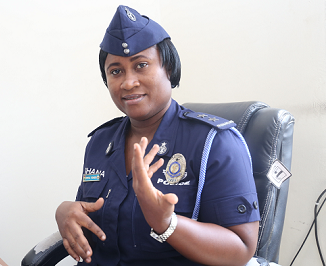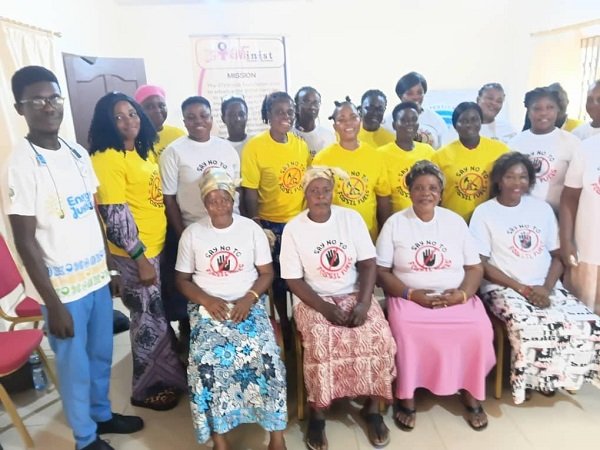Gender
Work from home – Frontline workers advocate

Some frontline workers have appealed to those who could work from home to stay home to reduce the rate of infections, from the coronavirus pandemic.
According to them, staying home is the surest way to avoid being exposed to the virus, which is wreaking havoc globally.
Speaking to The Spectator, the Director of Medical Affairs at the University of Ghana Medical Centre (UGMC), one of the COVID-19 treatment facilities in the country, Dr Kwame Anim-Boamah, said the best way to prevent an infection is to avoid crowds, adding that if one did not have a vehicle, and had to join the public transport all the time to work, it exposes the fellow to the virus.
According to him, the public should take the precautionary measures seriously because the virus is real, and people are getting infected on daily basis.
“COVID-19 is real, patients come in everyday, it is with us, you don’t have to get it before you know it is true,” he said.
Dr Anim-Boamah said, currently, the UGMC is treating a number of COVID-19 patients, with others at intensive care.
He advised those who have chronic diseases like hypertension, diabetes and others to periodically go for checkup as scheduled with their doctors, because their condition could be aggravated after contracting the virus, and urged the public to observe the prevention protocols.
The Greater Accra Regional Police Public Relations Officer, Deputy Superintendent of Police (DSP) Afia Tengey also urged Ghanaians who have the means to work from home “because, we have been made to understand that the virus does not move, rather it is those infected who move to spread it.
“People who do not need to be present in their work places, should be made to stay home, because one risks getting infected when moving about,” she said.
She said that, the police would enforce various preventive directives issued by the state to ensure lives were protected.
DSP Afia Tengey appealed to the public to always wear face masks when moving out, constantly wash their hands, use hand sanitisers, and ensure physical distancing to slow the rate of infections in the country.
She also called on organisations to ensure all the preventive measures put in place by the Ghana Health Service (GHS) were adhered to.
Mr Frederick Drah,53 years, who is a COVID-19 survivor also pleaded with Ghanaians not to take the virus for granted, and urged people to diligently observe all the precautionary measures to slow infection.
“At times I see people gathered and behaving as if we are in normal times, and I ask myself, whether people are aware of what is happening,” he said.
He also appealed to the public to desist from stigmatising those who have recovered from the COVID-19, because he had become a victim of the disease.
Mr Frederick Drah is a trader at the Tema port, who through his daily trek to and from the port caught the deadly coronavirus, and consequently spent 22 days at the Ga East Municipal Hospital where he was treated and discharged.
Currently, over 10,000 people have been infected by the virus, with about 3,755 recoveries and 48 deaths as at the time of reporting.
The country has been championing the mandatory wearing of face masks, hand washing, use of sanitisers and social distancing among others.
By Edem Mensah-Tsotorme
Gender
Workshop to deepen coverage of gender-based issues held in Accra
A training and capacity-building workshop was held on Thursday for the media to intensify coverage on gender-based issues to support women’s participation in leadership and governance in Accra.
The workshop, held under the theme ‘Strengthening Advocacy for the Implementation of Ghana’s Affirmative Action (Equity) Law, 2024 – The Case of the Media’, brought together journalists from selected media houses.
The Convener of the Affirmative Action (AA) Law Coalition, Ms Sheila Minka-Premo (Esq.), stressed that the media has a critical responsibility to educate the public on the importance of the Affirmative Action Act, noting that sustained and informed reporting would strengthen advocacy and support the effective implementation of the law.
While commending both the Legislature and the Executive for the passage and presidential assent of the Affirmative Action Bill into law, the AA Law Coalition Convener appealed to government to address existing gaps. These include the constitutional provision of 30 per cent women’s representation in politics, inadequate policy frameworks to advance affirmative action, and weak compliance by state institutions.
She charged the media to highlight and promote the role of women in leadership and to actively support a smooth and effective implementation process of the Act.
In her welcome address, Executive Director of ABANTU for Development, Dr Rose Mensah-Kutin, said the training sought to strengthen journalists’ advocacy skills to enable them to educate the public on the provisions and significance of the law.
Dr Mensah-Kutin commended ActionAid Ghana for supporting the advocacy efforts, urging the media to prioritise the law to ensure its sustainability.
The Affirmative Action (Gender Equity) Act, 2024 (Act 1121) was passed by Parliament in July 2024 and received presidential assent in September 2024, following years of sustained advocacy by women’s rights organisations, gender activists, and other stakeholders.
By Linda Abrefi Wadie
Join our WhatsApp Channel now!
https://whatsapp.com/channel/0029VbBElzjInlqHhl1aTU27

Gender
STEMinist Foundation, Keta Ramsar centre train women on rights, leadership

STEMINIST Foundation, Ghana, a Non-Governmental Organisation (NGO) with support from Keta Ramsar Centre has trained about 25 women selected from the Keta Municipality on the rights of women and how to use them for their voices to be heard in their communities.
STEMinist Foundation, Ghana, is a network of women advocating equal opportunities through excellent representation of women in Science, Technology, Engineering and Mathematics (STEM).
The women, mostly fishmongers and other self-styled workers, were taken through topics such as Understanding Energy and Climate Justice, Fossil Gas Expansion, Livelihoods’ Care Work and Health, Women Leadership, and Power Building among others.
Mrs Nerissa Edem Anku, Gender Justice Transition Advisor of the Foundation, noted that the theme “Energy Justice: Empowering Women with Power, Rights and Dignity,” was chosen for the women to reconnect, reflect, and look ahead in shaping their rights as women.
She stated that women have been relegated to the background in the communities when it comes to decision making, stressing the need to correct that for them to know they have rights to fight for themselves.
Mrs Nerissa Edem Anku further noted that women in fishing communities wanted to see real and tangible improvements in their living conditions, spearheaded by government to prevent unhealthy confrontations with the local people.
She assured that the NGO would continue to strengthen its programmes to ensure that women were empowered to contribute meaningfully to the socio-economic development of their families, communities, and the nation.
Miss Portia Adu-Mensah, Facilitator, Community Mobilisation Communicator, on her part added that all stakeholders have to adopt more innovative steps to build an environment in which women can thrive. That, she said, would win the confidence of the women and promote more inclusive partnerships.
The Assemblywoman for Dzelukope, Ruby Adukpoh, on behalf of the women thanked the NGO for the gesture and reaffirmed their commitment to strengthening their collective voices and influence in shaping policies that will affect them.
From Kafui Gati, Keta
Join our WhatsApp Channel now!
https://whatsapp.com/channel/0029VbBElzjInlqHhl1aTU27







